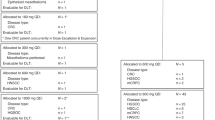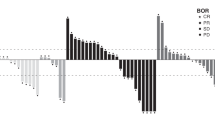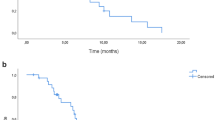Abstract
Tallimustine is a novel benzoyl mustard derivative from distamycin A with a unique mode of action. It is a DNA minor groove binder and produces highly sequence-specific alkylations. Previous studies have shown significant anti-tumour effects in animal models. We performed a phase II study in previously untreated patients with advanced colorectal cancer, using a schedule of i.v. bolus infusions of 900 microgram m-2 once every 4 weeks. Seventeen patients were enrolled, and no responses were documented in 14 evaluable patients. Toxicity mainly consisted a highly selective neutropenia, which warrants further investigation of this agent in combination with myeloid growth factors.
This is a preview of subscription content, access via your institution
Access options
Subscribe to this journal
Receive 24 print issues and online access
$259.00 per year
only $10.79 per issue
Buy this article
- Purchase on Springer Link
- Instant access to full article PDF
Prices may be subject to local taxes which are calculated during checkout
Similar content being viewed by others
Author information
Authors and Affiliations
Rights and permissions
About this article
Cite this article
Punt, C., Humblet, Y., Roca, E. et al. Tallimustine in advanced previously untreated colorectal cancer, a phase II study. Br J Cancer 73, 803–804 (1996). https://doi.org/10.1038/bjc.1996.140
Issue Date:
DOI: https://doi.org/10.1038/bjc.1996.140



